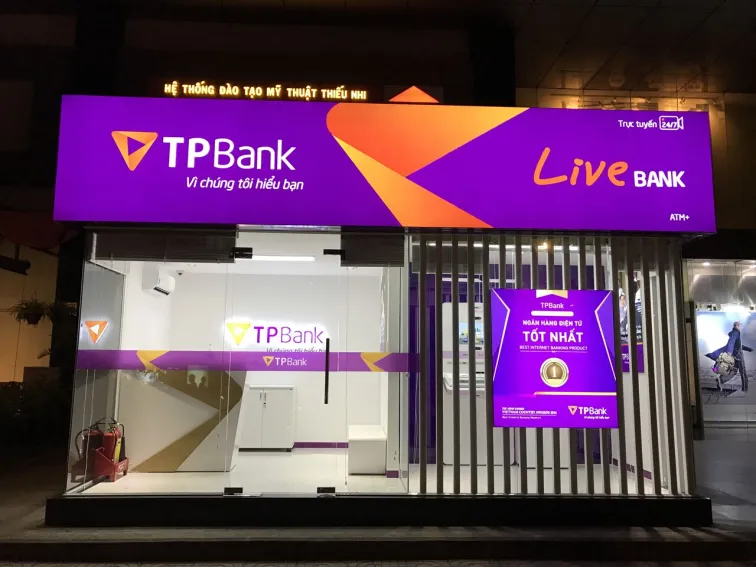
Fintech startup Scale360 deploys teller-less branches in Vietnam
TPBank launched 12 digital branches in 1Q17.
When UK-based fintech startup Scale360 set up a development centre in the heart of Thailand, it wanted to expand its reach in order to provide more customers with omni-channel solutions and innovative products in banking technology. One of the solutions Scale360 offers is the digital branch, and it has recently been working with a bank in Vietnam to help them connect with digital consumers.
From Vietnam to Singapore, more banks are setting up digital branches due to stronger regulatory support and strategic cooperation with fintechs. Customers are now trooping to these digital branches to open accounts and avail loans – transactions that were mostly done through physical branches – and banks are thrilled at how they are increasing customer transactions whilst reducing operational costs.
Over the past year Scale360 has scaled up its staff to over 125 people as it partners with more banks, including Vietnam’s TPBank which launched a dozen digital branches branded as LiveBanks in the first quarter of 2017. Customers could step into a LiveBank and tap on a machine to complete a transaction whilst an agent guides them through video instructions sent from a contact centre miles away.
“During the pilot period, most customers felt the digital branch was easy to use, had convenient banking hours and therefore would recommend its services to friends,” says Neville Molyneux, managing director at Scale360. “The feedback was positive, leading to an extension of the programme, with plans to open up to 50 digital branches by the end of the year.”
Offering the best of both worlds
TPBank and other Asian banks have discovered that digital branches offer the best of both worlds: Customers, especially in hard-to-reach areas, get access to a robust suite of traditional branch banking services whilst their retail operations slash costs by replacing expensive brick-and-mortar physical branches with digital branch machines.
“The introduction of our LiveBank service is an important element of our digital strategy,” says Dinh Van Chien, deputy CEO and head of retail banking at TPBank. “We aim to improve our customer’s experience with better accessibility to our products and services, as we need to adapt to fit our customer’s lifestyles.”
"Many banks are faced with the increasing cost of a branch network,” says Molyneux. “In urban areas branches are now under threat of being closed. In rural areas, there is plenty of white space, but banks are reluctant to commit millions of US dollar to open new branches. Deploying the digital branch helps banks reduce the operating costs normally associated with a traditional branch – real estate and staffing, whilst also cost-effectively extending opening hours,” he adds.
“From our understanding a traditional branch set-up in Thailand would cost around US$1 million. In the UK this could be between £3-5 million.
Scale360 Digital Branch list price will start at US$200,000, but of course final costs would depend on configuration and location. TPBank in Vietnam currently place their version in an existing shop or build a new unit. We have also developed a standalone ‘pod’ which could be deployed independently,” says Molyneux.
In smaller towns, digital branches can be used to give banks a presence where they may not be able to support a staffed branch. Molyneux says this is especially relevant in Asia where there are still a lot of under-banked or unbanked communities.
Meanwhile, in cities where rents are soaring and maintaining a physical branch presence is difficult, the digital branch can offer a more financially feasible option because it takes up less space and manpower to operate.
“In the UK, where branch networks have reduced dramatically, it will help reintroduce banks into areas where branches have been closed,” says Molyneux.
“The digital branch can be deployed in locations that offer convenient access, from deployment in existing branches to shopping malls, airports and high streets and more. As less real estate is required, it opens many more opportunities for banks to establish a branch where they may not have done so before,” he adds.
Retaining the human interaction
The explosion of digitisation initiatives in banking, led by fintechs, has greatly expanded the areas of mobile and Internet banking, but most banks choose to retain a large network of physical branches due to the high value still placed by customers on human interaction and branches.
An EY study on the future of retail banking last year found that more than half (55%) of people believed it is important to be able to speak with a real person at their bank round-the-clock. The same study further revealed that nearly half (44%) of people do not trust banks without branches and that more than half (55%) go to a branch or call when they want to purchase a product or get advice.
But Molyneux argues that the digital branch is the sensible alternative to physical branches – not mobile banking. The digital branch offers all products and services like a physical branch, as well as the one-to-one human interaction that most customers crave.
“We know that the smartphone has become the de facto way for people to book holidays and accommodation, call a taxi, order dinner – an app can define a brand’s success - and many brands have been able to make their service feel like a lifestyle choice,” says Molyneux.
“But when we thought about the importance of money, and banking, in people’s lives, trust becomes a huge factor. And are people really ready to trust all of their finances to an app on their phone? People want to be able to ‘touch’ their bank – or at least see its presence,” he adds.
Live video agents are the ace up the sleeve of digital branches, providing not only convenient assistance, but also creating a personal connection that lends confidence to Asian customers when conducting critical or high-value transactions.
“Being able to access specialist assistance on demand from loan or investment advisors helps banks maximise upsell opportunities whilst delivering enhanced customer service. Importantly it gives customers a physical link to their bank, retaining a human touch that helps banks build worthwhile relationships with their customers,” says Molyneux.
“This relationship also provides customers with security and reassurance that their bank is there when they need it most,” he adds.
Live video support is becoming a best practice among Asian banks dipping into the digital branch trend. In Singapore, DBS/POSB has launched new VTMs across nine locations, including Rivervale Plaza and Tampines Hub, with the option for virtual teller assistance via live-video streaming should customers need help when they apply for debit cards, enquire their balances, or obtain internet banking tokens.
Regulatory easing underway
Beyond Vietnam where it helped TPBank launch its LiveBanks, Scale360 is looking to expand its digital branch partnerships to banks in other Asian countries like Indonesia, Sri Lanka, and Taiwan. The startup holds a sanguine outlook given the regulatory easing underway globally.
“We have found that central banks around the world are encouraging banks to become more digital and shed legacy technology,” says Molyneux.
“Regulators from Vietnam the UK, Singapore, Taiwan, Indonesia, to name a few, are all working and are open to the enablement of digital banking and are actively supporting such initiatives. Fintech is driving around the globe,” he adds.
He adds that existing regulations are also being enhanced to allow new processes specific to digital banking such as electronic know your customer (eKYC), ID scanning, biometric ID verification fingerprint scanning, and allowing documents to be signed in front of a video teller.
Last year, Bank of Thailand, announced guidelines on eKYC and allowed banks to open accounts for customers via video conference under the condition that the digital branch made it clear the event was happening live and that the sound and video quality were clear enough to help identify the applicant and verify their identity as would be done face-to-face.
“It’s encouraging to see the regulators proactively supporting digital and fintech. It is evident that regulators in the digital age are finely tuned to changing customer needs,” says Molyneux.



















 Advertise
Advertise














